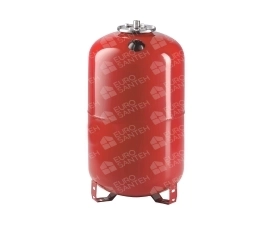Expansion tanks for heating for 150 liters in Chisinau
Expansion tanks for heating systems with a capacity of 150 liters are integral components in modern heating setups, playing a pivotal role in ensuring the efficient and reliable operation of the entire heating infrastructure. These tanks are engineered to counteract the expansion and contraction of the heating medium, typically water, as it undergoes heating and cooling cycles, thereby preventing excessive pressure buildup within the system.
The primary function of an expansion tank is to maintain a constant pressure within the heating system. As water heats up, its volume expands, potentially leading to a significant increase in pressure without a properly sized expansion tank. This pressure surge could result in damage to various components of the system, such as boilers, pipes, and radiators. A 150-liter expansion tank provides the necessary volume to absorb this expansion, effectively regulating the system's pressure and protecting it against damage.
There are several types of expansion tanks available, but the most common type used in heating systems is the diaphragm expansion tank. It consists of a metal shell with a flexible diaphragm inside, dividing the tank into two chambers: one filled with the heating medium and the other with compressed air or nitrogen. As the pressure in the system fluctuates, the diaphragm expands or contracts, allowing the tank to adjust its volume and maintain a consistent pressure level.
Expansion tanks for heating systems with a capacity of 150 liters are suitable for a wide range of heating applications, from residential homes to commercial buildings. They can be utilized in systems with both natural and forced circulation of the heating medium. These tanks play a critical role in ensuring the smooth and safe operation of the heating system, providing an additional layer of protection against pressure-related issues.
When selecting an expansion tank, it is essential to consider factors such as the size of the heating system, operating pressure, and temperature range. The tank should be appropriately sized to meet the specific requirements of the system and be compatible with its overall configuration. Additionally, the construction materials of the tank should be durable and resistant to corrosion to ensure long-term reliability and performance.
Proper installation of the expansion tank is vital for its effective operation. The tank should be installed in a location where it can easily adapt to changes in pressure and temperature within the system. It should also be securely mounted and positioned vertically to prevent damage or leaks. Additionally, the air charge of the tank should be checked and adjusted regularly to maintain optimal pressure levels within the system.
Regular maintenance of the expansion tank is also necessary to ensure its continued operation. This includes inspecting the tank for signs of damage or corrosion, checking the integrity of the diaphragm, and replacing any worn or damaged components as needed. Periodic testing of the tank's pressure and air charge is also recommended to ensure that it remains within the specified range.
In conclusion, expansion tanks for heating systems with a capacity of 150 liters are essential components that play a crucial role in maintaining the efficiency and safety of modern heating systems. By selecting, installing, and maintaining the appropriate expansion tank, you can ensure reliable and trouble-free operation of the heating system for many years to come.







